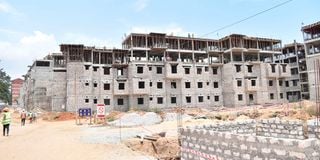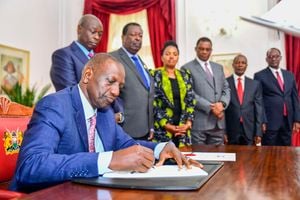
Construction of affordable housing units at Buxton Point in Mombasa County on February 7, 2022.
Auditor-General Nancy Gathungu has questioned the use of Sh11.66 billion, part of an international loan given to Kenya in 2019 for its affordable housing programme.
In a report tabled in the National Assembly, Ms Gathungu says she could not establish how the amount disbursed by the International Bank for Reconstruction and Development (IBRD) to Kenya Mortgage Refinance Company (KMRC) was spent.
According to the audit report, a financing agreement was signed on December 5, 2019, up to June 30, 2025. Through the pact, IBRD advanced a €219 million (Sh29.99 billion at today’s rates) loan to Kenya to help targeted beneficiaries.
The report states that the housing project consisted of two parts: support to the KMRC, the principal lenders for the affordable housing project, and technical assistance, which was to be provided by the Treasury and the Lands ministry.
Ms Gathungu says in her report that out of the €219 million loan signed, €91.24 million, equivalent to around Sh11.66 billion when the report was made, had been issued to KMRC by June this year.
The report, however, says despite the disbursement of the funds to the Kenya Mortgage Refinance Company, onward disbursement to beneficiaries could not be established.
“In the circumstances, the accuracy and appropriate utilisation of [Sh11.66 billion] disbursed to KMRC for project implementation could not be confirmed,” reads the audit report.
Ms Gathungu says she could not confirm the use of the money because the financial statements of KMRC are not audited by her office or any other delegated Auditor-General appointed in line with Section 23 of the Public Audit Act, 2015.
Established in April 2018 as a public-private partnership (PPP), under the supervision of the Central Bank of Kenya, KMRC’s role is to provide long-term funds to primary mortgage lenders (banks, microfinance banks, and Saccos) to increase the availability and affordability of home loans to Kenyans.
Also questioned by the Auditor-General is Sh1.67 million spent on return air tickets for officers who went to Kuala Lumpur, Malaysia, for a benchmarking visit on the risk-sharing facility of affordable mortgages.
Ms Gathungu says the payment made to the travelling firm was not supported by a list of participants for the training, there was no proof of attendance by the participants, and neither were there copies of passports or reports of the benchmarking.
“In the circumstances, the propriety and value of air travel expenditure of Sh1,672,770 could not be confirmed,” reads the audit report.
In auditing terms, a qualified opinion is issued by the Auditor-General upon conclusion that except for specific issues, the financial statements of an entity present a true and fair view in accordance with the applicable financial reporting framework.
A qualified opinion indicates that the financial statements of an entity are to a large extent in agreement with the books of accounts and the underlying records — except for a few cases where there are material misstatements or omissions noted.
Before President Ruto ascended to power, introducing a mandatory levy for employed Kenyans for the housing programme, his predecessor Uhuru Kenyatta was running an affordable housing programme that required voluntary online registration for prospective buyers.
Contributions were also by choice and Mr Kenyatta had conceptualised the programme to give a refund if the contributor did not get a house.
“We want our Kenyans to be home owners. That is what we are trying to do. We are misleading people by telling them it is a tax but it is not a tax. It is a saving and a contribution towards owning a home; that ultimately, even if you don’t get a house, that money goes back to the individual. That is why I initially talked about building and developing a culture of saving in society,” he said in a 2017 interview.
After court challenges relating to the manner of levying Kenyans, Mr Kenyatta ended up working in partnership with financial institutions, private developers and manufacturers for the project.










